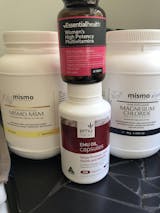Magnesium Chloride vs. Other Forms of Magnesium
Magnesium is an essential mineral that plays a crucial role in various bodily functions, including muscle and nerve function, blood sugar regulation, and bone health. Given its importance, it's no surprise that there are several different forms of magnesium supplements available on the market. Let's look into the most popular forms of magnesium supplements and discuss their respective benefits, drawbacks, and best uses.
- Magnesium Citrate
Magnesium citrate is a common form of magnesium supplement that's known for its fast-acting laxative properties. Because of this, magnesium citrate is often used to treat constipation or to prepare for certain medical procedures, such as a colonoscopy. However, the laxative effects of magnesium citrate can be quite strong, so it's not recommended for regular use. Additionally, some people may experience abdominal discomfort or diarrhoea when taking magnesium citrate.
- Magnesium Oxide
Magnesium oxide is another popular form of magnesium supplement. It's relatively inexpensive and has a high elemental magnesium content, meaning that a smaller dose can provide a significant amount of magnesium. However, magnesium oxide is not as well absorbed as other forms of magnesium, so it may not be the best choice for people with digestive issues. It's also not recommended for people with kidney problems, as the high magnesium content can put additional strain on the kidneys.
- Magnesium Glycinate
Magnesium glycinate is a form of magnesium that's chelated, or bound, to the amino acid glycine. This makes it easier for the body to absorb and can also help to reduce the risk of gastrointestinal side effects. Magnesium glycinate is often used to help with relaxation and sleep, as glycine itself has calming properties. However, magnesium glycinate tends to be more expensive than other forms of magnesium.
- Magnesium Chloride
Magnesium chloride is a form of magnesium that's often used topically, as a spray or oil. When applied to the skin, magnesium chloride is absorbed directly into the bloodstream, bypassing the digestive system. This makes it a good option for people with digestive issues or those who don't like taking supplements orally. Magnesium chloride is also known for its ability to reduce muscle tension and improve sleep. However, it can be quite irritating to the skin in some people, so it's important to do a patch test before using it.


![]() 5. Magnesium L-Threonate
5. Magnesium L-Threonate
Magnesium L-Threonate is a unique and highly absorbable form of magnesium that deserves a mention. What sets it apart is its ability to cross the blood-brain barrier effectively, which allows it to support brain health and cognitive function. This form of magnesium has gained attention for its potential benefits in enhancing memory and overall cognitive performance.
While Magnesium L-Threonate may not have the laxative effects of magnesium citrate, the absorption advantage makes it an attractive option for those looking to support brain health in addition to addressing magnesium deficiency. Keep in mind that it may be pricier than some other forms of magnesium.
All forms of magnesium supplements have their advantages and disadvantages. It's best to talk to your healthcare professional before incorporating any new supplements into your diet. By doing so, you can ensure that you're getting the right form and amount of magnesium to support your overall health and wellness.


So, which form of magnesium is the best? It really depends on your individual needs and preferences. If you're looking for a supplement to help with constipation, magnesium citrate may be your best bet. If you're on a tight budget, magnesium oxide may be the most cost-effective option. If you're looking for a supplement that's easy to absorb and won't upset your stomach, magnesium glycinate may be the way to go. And if you're looking for a topical option, magnesium chloride may be the best choice.

















Hi Che. Thank you for reaching out! Magnesium Chloride could be a great option for making your own electrolyte solution. It’s known to be easily absorbed and has various health benefits. However, I’d recommend consulting a healthcare professional or a nutritionist to ensure you get the right balance and formulation for your homemade electrolytes. They can provide guidance tailored to your specific needs and health condition.
I am seeking a magnesium to make my own electrolyes because natural favors, stevia, make me so sick. I noticed you did not provide information on magnesium sulfate. Enjoyed your site it was very easy to read and navigage. Thank you.
Leave a comment